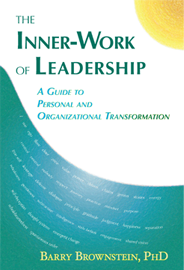Many Americans believe next month’s midterm elections matter a great deal. Republicans are hopeful they can regain the House and Senate. Democrats are hoping their losses are not as severe as some predict. The Tea Party is hoping they will emerge as an important new voice in politics.
Unfortunately, despite who is elected this November, before things get better, they will probably get a lot worse. And no, it is not the fault of the politicians. This is because the candidate that is running virtually unopposed is the ego-based decision-maker in our own mind. This election day, and most days, we will choose to reelect our ego.
Once we pull the lever for our ego, we become very good at blaming. Egos are very good at finding an external cause for their predicament. We are angry, our ego tells us, because we are caught in a traffic jam. We are anxious, our ego tells us, because we have a difficult phone call to make later in the day. We are unhappy, our ego tells us, because we are not making enough money.
Having blamed external circumstances for our predicament, our ego then tells us we need more of this and less of that to solve our problems. We have not only identified the problem where it is not, but we spend more time complaining about our perceived problems than doing anything to solve them. As we complain, as we share our tedious stories, we seek our witnesses that will agree with us that our view of the world is correct.
This morning on MSNBC, Donald Trump revealed that he is “absolutely thinking about” running for president in 2012. As you might expect from Trump, he was not short on glib and, at their core, nonsensical sound bites packed with blame.
He proclaimed that “outside forces are destroying this country” and that “we are treated unfairly” by countries like China. He professed to share insider stories that unnamed people in China have said to him “we can’t believe what we are getting away with” in China’s relationship with the United States.
Of course, you don’t have to be a Freudian psychiatrist to analyze that in reality Donald Trump can’t believe what he is getting away with. Despite multiple bankruptcies and lawsuits against his organizations, lenders still lend him money. Despite having nothing but blame in his arsenal of rhetoric, any talk show in America would be glad to have him make a guest appearance. And no doubt in contemporary America, if he was to run for president, his populist chord would resonate.
What exactly is China getting away with? In his words, China has “a false currency,” presumably because Trump has proclaimed that the yuan is undervalued. While this makes a good blaming sound bite and is sweet music to the ears of every ego, not every economist agrees this is true.
And suppose the yuan is undervalued, then what? Should we shoot ourselves in the foot and start a trade war, as Congress threatened to do last week? Should we, as Trump suggests, send “ten brutal killers (killer is Trump’s word for negotiator) that are smarter than anyone” to make China do our bidding? Presumably those smart but brutal killers will somehow force China to increase the value of their currency. Sounds like Donald has been watching too many Hollywood movies and spending too much quality time with his ego. If he could force China to increase the value of their currency then what? Domestic prices in the United States will increase and perhaps our exports to China might even fall. Why? Rising interest rates are one method by which China would increase the value of its currency. Rising interest rates would slow down the Chinese economy and reduce foreign trade.
“Here’s a thought test” Mish Shedlock recently wrote: “What would happen if China raised prices 20% across the board via an export tax or reevaluation of the Yuan, starting tomorrow?” Mish continues,
For starters, the Chinese economy would implode overnight along with collapsing exports. US importers such as Walmart, Target, Best Buy, and Kohls would seek new supply chains from Vietnam, Korea, Singapore, or India, but that would take time. In the meantime, US stores would run out of some goods. US consumers would go on strike until the supply chains were restored. Hundreds of small businesses would go bankrupt. Finally, businesses going bankrupt would pressure the banking system.
It is an iron-clad law of human relationships that blame escalates into conflict. In the realm of interpersonal relationships, this conflict often takes the form of simmering hostilities. Sometimes outright hostilities result and two people part company. However, when countries get involved in the blame game, war is often the result. Any action that reduces trade makes both parties worse off. Given enough reduction in trade, impoverishment is a result. For example, think about what would happen if for all your goods and services you had to depend on just those businesses and individuals within a one-mile radius of your home. Life would be very hard.
As we explained last week, as suffering increases it is easier to get the masses to agree on a negative program such as blaming China, then to agree on a positive program such as returning to the principles and values that help generate American prosperity.
But let’s be clear, the Donald Trumps of the world are not the problem; they arise because we keep reelecting the ego in our own mind to analyze the world and make decisions for us. Our ego, like Donald Trump, promises us it will keep us safe by controlling the world and defending us from our external enemies. Trump was espousing nonsense this morning, but every day we all listen to nonsense broadcast by our ego 24/7.
Fortunately there is an alternative. We can first become aware that there is another candidate that we can elect to be the decision-maker in our own mind. If we become aware of this other candidate, we can vote against our ego; the ego doesn’t really run unopposed. This other candidate, which I call our True Self, does not speak in sound bites. It does not blame external circumstances.
Our True Self speaks quietly, and we hear its voice only when we are still enough to listen. For our real problems, it offers real solutions—solutions grounded in timeless principles and timeless values. It does not view others as objects; others are not evaluated by how well they are meeting the needs of our ego. Instead, it recognizes a community of life of which we are a part.
When we reelect our ego, we choose to separate ourselves from our True Self; with that choice we block our source of inspired ideas, wisdom, and love. Believing we are separate from our True Self and from everyone else, we have nothing but the dysfunctional thinking generated by our ego to fall back on to solve our perceived problems. The popularity of Donald Trump is simply a manifestation of our internal decision. As within, so without.



Dear Barry
Thank you.
Love… John
John A Wood
Australia
Barry,
Thanks for reminding me to wear my life preserver, to keep my head above the “sea of mental garbage”. (I’m still working on a seaworthy boat). -Steve
Dear Barry,
Thanks for this fine focus on the inside-out nature of governance.
I’m fantasizing about an air-drop of 534 (not a typo) copies of “The Inner-Work of Leadership” onto the steps of the US Capitol, at the beginning of the next Congressional session. No doubt the helicopter would be shot down as a terrorist threat. Realistically, though, I wonder if there are any leadership grants we could leverage to fund such an effort. (If you get funding, I will personally take a yellow highlighter to all the Hayek and related quotes, prior to their delivery, since I know the intended readers will want the short course.)
Thanks again!
All the best,
Lyn